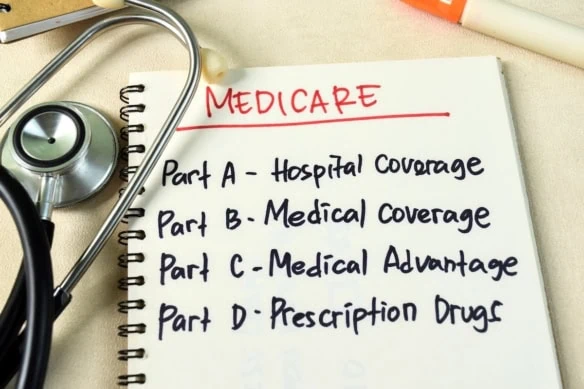The older you get, the more of a concern your health typically becomes—which means your health care decisions become increasingly critical over time.
Most older adults end up relying on Medicare—a federal health insurance system for individuals—for their health care needs. To be eligible, an American must either be at least 65 years old, have a disability, or have one of a few specific chronic conditions. And while taking Medicare isn’t mandatory, it’s usually more cost-efficient than most private-market options.
But there isn’t just one Medicare. When it comes time to sign up for your health care, you have a pair of choices that we’ll discuss today.
Which should you pick—Original Medicare or a Medicare Advantage plan? Today, I’ll explain the benefits of each option so you can make a more informed decision about your Medicare coverage.
Featured Financial Products
What Is Original Medicare?

Original Medicare consists of Medicare Parts A and B.
Part A is the hospital insurance part of Medicare that covers inpatient hospitals, hospice centers, inpatient rehabilitation centers, and more.
Medicare Part B is medical insurance. It fills in much of what Part A doesn’t cover, such as physicians’ services, outpatient hospital visits, and durable medical equipment.
Do you want to get serious about saving and planning for retirement? Sign up for Retire With Riley, Young and the Invested’s free retirement planning newsletter.
What Is Medicare Advantage?

Medicare Advantage, also referred to as Medicare Part C, is an alternative to Original Medicare.
Part C plans are offered by private insurers, and they provide the services of both Part A and Part B. Often, they also cover Part D—Medicare’s prescription drug coverage. And, as I’ll discuss in a moment, Part C can provide other coverage, too.
Benefits of Original Medicare Over Medicare Advantage

Some people have the “If it ain’t broke, don’t fix it” mindset, preferring Original Medicare. It offers more flexibility than Medicare Advantage, low-income users can get payment help, and if coverage isn’t sufficient, you can buy supplemental coverage.
Let’s look at where Original Medicare shines compared to Part C.
Doctor + Hospital Flexibility

Original Medicare users can go to any hospital or doctor that accepts Medicare anywhere in the country. Traveling to visit your child in another state? You can get medical care there. You typically don’t need referrals to see a specialist, either.
Medicare Advantage plans, on the other hand, usually only allow members to use doctors and other providers within the plan’s network and service area for non-emergency care. And if you need to see a specialist, you might need to get a referral.
Related: What Is Medicare? A Guide to Types of Medicare Coverage
Medicare Savings Programs Can Help Some People Save Money

Health care expenses can be high, so when people are struggling financially, they often look for ways to reduce Medicare expenses. One way to save is through Medicare Savings Programs (MSPs), which are state-provided programs that help Medicare recipients pay for their Parts A and B premiums.
To be eligible for an MSP, people need to have Medicare Part A and meet their state’s income and asset limits.
MSPs don’t cover costs for Medicare Advantage plans. If you need help from these programs, Original Medicare makes more sense for you.
Related: Here’s How You Can Lose Medicare [And How You Won’t]
Ability to Buy Medigap

Medicare Supplement Insurance (Medigap) is supplemental coverage that Original Medicare users can buy from a private provider. This supplemental insurance can help cover out-of-pocket costs that Original Medicare doesn’t pay for.
Medigap works with any doctor or hospital that accepts Medicare. The price and amount of coverage varies by policy.
If you have Medicare Advantage, you can’t add Medigap.
Related: How Seniors Can Advocate for Themselves at the Doctor’s Office
Benefits of Medicare Advantage Over Original Medicare

Medicare Advantage attempts to fix some of the pain points of Original Medicare. It covers many services that Original Medicare doesn’t, plans have out-of-pocket maximums, and it usually eliminates the need for Part D.
Take a peek at why some people prefer Part C to the original combo.
Out-of-Pocket Limits

Medicare Advantage plans have an annual limit on what a person pays out-of-pocket for covered Part A and Part B services. The annual limit differs for in-network and out-of-network services. After a person reaches their plan’s limit, they don’t need to pay anything for covered services for the remainder of the year.
Original Medicare, however, has no yearly limit on out-of-pocket expenditures—unless that person has supplemental coverage such as Medigap, Medicaid, union, or employer coverage.
Featured Financial Products
Related: Don’t Overpay for Medicare: How to Avoid the Late Enrollment Penalty
Vision + Dental Coverage Often Included

Original Medicare covers the majority of medically necessary services and supplies that people need in doctors’ offices, hospitals, and other health care facilities.
Medicare Advantage needs to cover all of the same medically necessary services that Original Medicare does. But some MA plans handle more costs that Original Medicare doesn’t cover. For example, Original Medicare doesn’t cover routine eye exams or most dental care, but some Part C plans include coverage for these services.
Related: Medicare FAQs: Your Questions Answered
Prescription Drug Coverage Usually Included

Original Medicare doesn’t include prescription drug coverage; instead, you have the option to purchase Medicare Part D from private insurance companies. This entails a separate premium that is technically based on the person’s income, though income-related monthly adjustments only affect about 8% of Part D beneficiaries.
Most Medicare Part C plans include prescription-drug coverage as part of the package.
The distinction isn’t a big one—you have an easy path to coverage both ways (buy Part D if you have Original Medicare or find a Part C plan with drug coverage)—but it’s important to understand, including when you’re comparing costs.
Related: Health Care Costs in Retirement [Amounts + Types to Expect]
What About Premium Costs?

Health insurance premiums are often the most significant annual medical cost for retirees, so naturally, you might be wondering which Medicare route offers the more affordable premiums.
The answer: It depends.
About 99% of Medicare users don’t need to pay Part A premiums.
Part B premiums, deductibles, and coinsurance rates are determined according to provisions of the Social Security Act every year. The standard monthly Medicare Part B premium for 2025 was set at $185 for individuals with a modified adjusted gross income (MAGI) of $106,000 or less, or couples filing jointly with a MAGI of $212,000 or less. The premium amount increases with income. The highest bracket is individuals with a MAGI of $500,000 or more (couples filing jointly: $750,000+), who have a monthly premium of $628.90. Premiums are different for individuals with immunosuppressive drug coverage.
The CMS projects that 2025’s average total monthly premium for Part D coverage will be $46.50, down from $53.95 in 2024.
Medicare Advantage users pay the plan’s premium as well as the monthly Part B premium. Some plans charge no premium ($0) and might even help cover part or all of the Part B premium. The plan’s premium varies depending on which private provider you choose. According to the Centers for Medicare & Medicaid Services, the projected 2025 average premium for individual Medicare Advantage Plans was $17 per month.
Related: When Should You Take Social Security?
Can I Switch Plans if I Change My Mind?

Yes, if you enroll in Original Medicare and want to switch to Medicare Advantage, or vice versa, it’s possible to do so.
To switch to Part C coverage, you need to wait until the Annual Enrollment Period, which runs from Oct. 15 through Dec. 7 every year. If you have Part D, you’ll need to contact your plan provider directly to disenroll as you can’t have both Part D and Part C.
If you have Medicare Advantage and want to switch to Original Medicare, you need to contact your plan provider or Medicare directly. Also, understand that disenrolling in Part C could result in losing vision, dental, or prescription drug coverage, so you either need to buy additional private coverage or plan to pay out-of-pocket.
Related: What Are the Average Retirement Savings By Age?
When Original Medicare Makes Sense [Example]

Do you identify as a “snowbird?” Perhaps most of the year you live in Wisconsin, but once the frigid winter temperatures begin, you flee to a secondary residence in Arizona to thaw out. Original Medicare provides nationwide coverage at any provider accepting Medicare, which the vast majority do. You would put Wisconsin down as your primary residence, but were you to need to see a doctor in Arizona, you could do so without any financial hiccups.
You don’t have to be a snowbird, of course—Original Medicare is a significantly better deal for anyone who anticipates moving about the country throughout the year.
While Medicare Advantage might cover you for emergency care, you’re unlikely to be covered for more routine care performed out-of-state and could be hit with a hefty bill.
Related: How to Invest for (And in) Retirement: Strategies + Investment Options
When Medicare Advantage Makes Sense [Example]

Does budgeting and paying countless bills every month stress you out? Medicare Advantage can simplify your finances a bit. Depending on the plan you pick, you could pay just one premium for health care (including prescription drug coverage), vision, and dental. This can make budgeting in retirement an easier task.
And as previously mentioned, Original Medicare doesn’t cover routine eye exams or most dental care. For people with certain eye or dental conditions, this can necessitate getting vision and dental insurance. That’s additional separate bills to pay, and different people to argue with on the phone if one of your bills was done incorrectly.
If you seek a one-and-done premium, Medicare Advantage might make more sense for you.
Featured Financial Products
Related: You May Want to Skip These Popular Retirement Rules






![Health Care Costs in Retirement [Amounts & Types to Expect] 31 health care costs in retirement](https://youngandtheinvested.com/wp-content/uploads/health-care-costs-in-retirement-600x403.webp)

